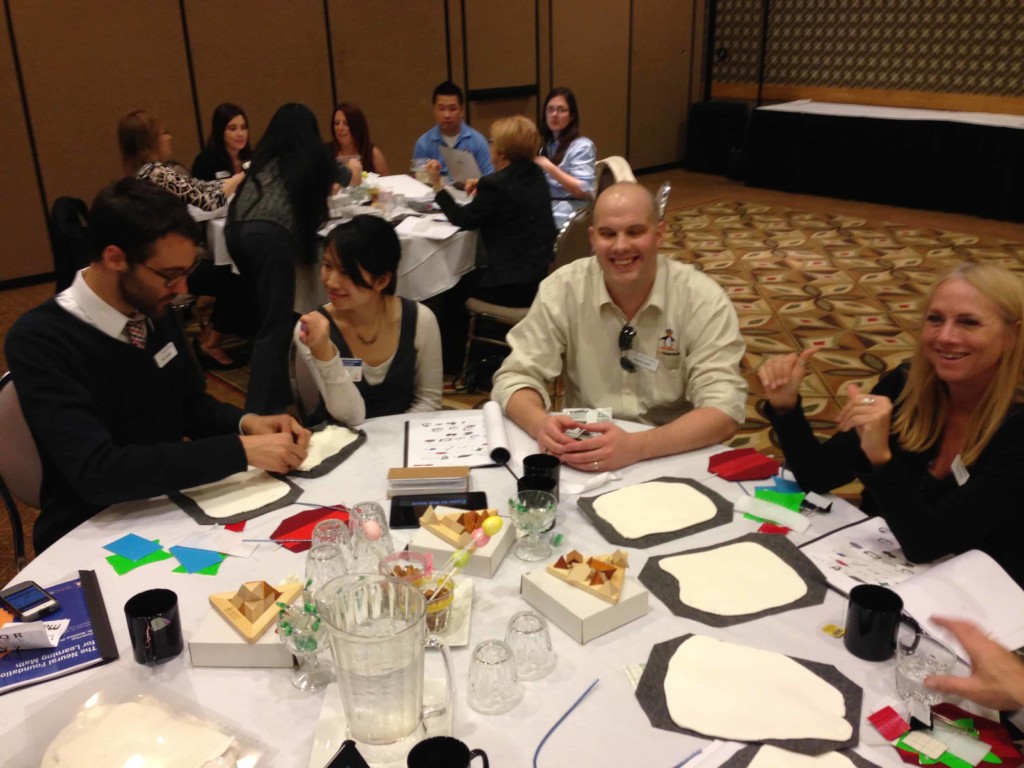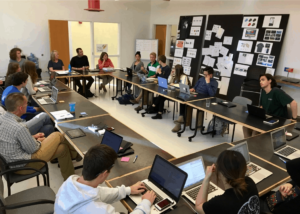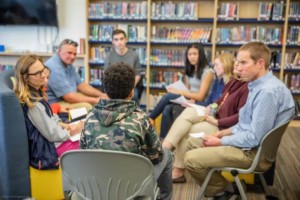Agreement Crafting: 10 Lessons on The Politics of Schooling

Managers execute where they are.
Leaders transport groups to places they’ve never been.
With the challenge of higher expectations and the emerging potential of personalized learning, good principals need to do both. That’s lesson #1:
Effective principals must be great leaders and great managers
Great principals innovate and execute, they coach like Doug Lemov and disrupt like Clayton Christensen. They help teams operate at very high levels under existing conditions and continually (or at least periodically) break and reshape those conditions for the benefit of students. Distributed leadership and some degree of specialization can help spread the load but every school needs an agenda that balances improvement and innovation.
In the broadest sense, leadership is politics. It is the formulation of temporary coalitions in support of public agreements about public systems. That’s lesson #2:
Schools are social institutions, the health of which depends on the temporary agreements among stakeholders
Superintendents and principals are the parties most responsible for these agreements whether articulated or otherwise more subtlety understood. Schools are not unusual in this regard, all organizations orbit around a set of agreements, but schools require an unusual number of people be party to the agreements, the agreements are unusually complex, the stakes are unusually high, and school leaders have unusually little control over the parties involved. The scale, complexity, stakes, and loosely coupled nature of the educational enterprise requires leaders to reach out, frame questions, build consensus and enact agreements. That’s lesson #3:
School agreements are community agreements
State standards enacted in the 1990s defined a new goal of helping all students graduate ready for further learning, work and citizenship, thereby challenging the beliefs, assumptions, structures, practices—the stakeholder agreements—of the American educational system. This new proposition—one that is necessary, possible, and just— requires educational leaders to craft new agreements and multiplies the complexity and difficulty of educational leadership in the new century.
State assessments now regularly diagnose, admittedly in an incomplete fashion, the health of the temporary agreements that leaders craft or inherit. Sick schools–while they may face daunting challenges, be under funded, and have ill-prepared teachers– suffer most from a lack of leadership. The root cause is bad agreements, that’s lesson #4:
Sick schools have sick agreements
The agreements made or tolerated in sick schools leave children ill-prepared for the world they will inherit and do a particular disservice to disadvantaged youth. The identification of sick schools has resulted in a variety of district and state interventions. These leadership injections are an attempt to rapidly reshape agreements by creating a clear focus, positive culture, and powerful student learning experiences. Lesson #5 summarizes what we’ve learned about turnarounds:
Healthy schools have clear goals, positive cultures, and promote powerful learning.
These basic strategies have proven successful at many elementary schools but are only a first steps at the secondary level. They don’t address two fatal flaws of large comprehensive secondary schools: anonymity and incoherence. The fix is a mixture of improvement and innovation. Doing things better and differently lesson #6:
The agreements that support great schools embrace the paradox of rigor and relationships
Since Deborah Meier opened Central Park East Secondary School in 1985, we’ve learned a great deal about how to create powerful secondary schools. In the last 20 years, thousands of good schools—schools that prepare all students for college, work and citizenship—have been opened nationally. Successful secondary schools embrace paradox: rigor and relationship, results and respect. They are humane in scale, intensely personal, singularly demanding. Their clear focus brings to a sharp point a broad narrative that articulates a common intellectual mission, illustrates means to important ends, strikes a balance between striving and supporting, demands performance with purpose. These concise yet complex agreements lived out by teachers and students are the evidence of leaders at work.
Most schools operate as part of a public school district where superintendents have four jobs:
- managing the policy work of the board;
- managing improvement across an complex organization;
- building community and public support; and
- developing an innovation agenda to introduce new learning experiences and environments.
Most superintendents accept inherited agreements in the first three categories, adding minor amendments as signature attempt at the fourth. New superintendents need to consciously adopt, modify, or reject the agreements that they inherit based on a deep understanding of the local context and exposure to strategic options. Existing superintendents need to surface and reexamine agreements with stakeholders in light of new challenges and evidence of success. It all starts with making the case; that’s lesson #7:
Leaders make the case for change
A change effort starts with looking at the system with new eyes and surfacing existing agreements and assumptions. Least well understood, and central to all four roles of the superintendent roles, is the question: how should the system work? With growing diversity, emerging opportunities and challenges of information technology, evolving knowledge about high performance organizations, and new proposition that all students can and should achieve at high levels, it’s still not clear what success at scale will look like. The new proposition of the standards movement—that all students should leave high school prepared for college, work and citizenship—is widely accepted but far from reality. It’s tough, but leaders need to paint a vision of a desired future state; that’s lesson #8:
Leaders articulate a compelling vision of how the system should work
There are few if any American public school districts that have achieved the ‘all kids college ready’ goal. There are few agreements that we could yet call best practices. With a variety of strategies being deployed, it seems safe to say that, save only the question of the purpose of education, the agreement about how the system should work is the most important bargain that every superintendent will craft.
However the question is answered, it takes many parties to the agreement: a school board, senior district staff, unions, business and civic leaders, parents and students. Radically changing the way a school system works takes sustained leadership: a reshaping of virtually all of the agreements between the district and schools and many of the basic agreements inside schools. Making any answer work appears to take a sustained effort of at least a decade with concerted attempts to broaden the leadership and ownership of a particular scheme. There’s no quick fix, that’s lesson #9:
Sustained rather than heroic leadership produces results
The role of agreement crafter implies the need for new experiences and skills for both principals and superintendents. Prospective superintendents need opportunities to study a variety of approaches and the context in which they are being deployed. Agreement crafters must be politically savvy, possess sophisticated consulting skills, and be adept campaign leaders and change managers. Both principals and superintendents need to be aware of community power structure, key influencers, and political decision makers.
The potential of next generation learning is increasingly clear but the toolset and models aren’t easy to deploy. Matt Candler, 4.0 Schools said, “In the pursuit of a better way, we must make many, many more smaller, faster bets. This requires a bias to action, not a bias to certainty.”
This iterative work requires a new set of consulting skills to design and facilitate a series of linked conversations that lead to adult learning, shared vision, and temporary agreements that keep a community moving. This is complicated work, so it needs to be broken down; that’s lesson #10:
Leaders need to link and sequence change in manageable chunks
As change managers, principals and superintendents must sequence complex tasks–often a mixture of improving the old system and building the new system– in a way that is manageable for the staff (and community) to incorporate.
Matt says we need to adopt a lean startup mindset: user-centric, curious, and iterative. The 4.0 team are the inspiration for the innovation mindset chapter that opens our recent book, Smart Cities that Work for Everyone.
Writing after World War II, the Polish poet Szymborska said “I apologize to big questions for small answers.” Agreement crafters won’t have to offer that apology if they ask and help their community answer the big questions.
For more on leadership, see:
- Preparing Principals: Consider the Adaptive Challenge
- Deeper Learning for Every Student Every Day
- Innovation & Improvement Takes a Sustained Push
- Embracing Paradox Leads to Breakthroughs








john thompson
Thank your for an astute and detailed explanation of why NCLB-type accountability never had a snowball's chance of improving education. I'll be looking forward to your incorporation of Deborah Meier's wisdom into a different type of ESEA
Replies
Tom Vander Ark
If we had more principals like her we'd need less accountability. But we've got about 10,000 really bad schools that inadequately serve low income communities. I think we need a 'good school promise' that ensures that all families have access to quality.
Like Sizer, Meier ran great schools but didn't believe in replication (just daily re-creation of great schools). High poverty/high performing networks was an important edu-breakthrough in the last 10 years.
That's why I support strong accountability and charter networks, two things Meier doesn't seem to agree with.